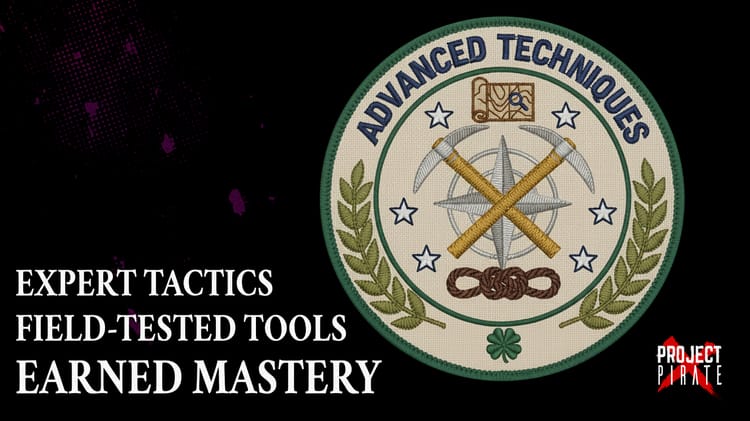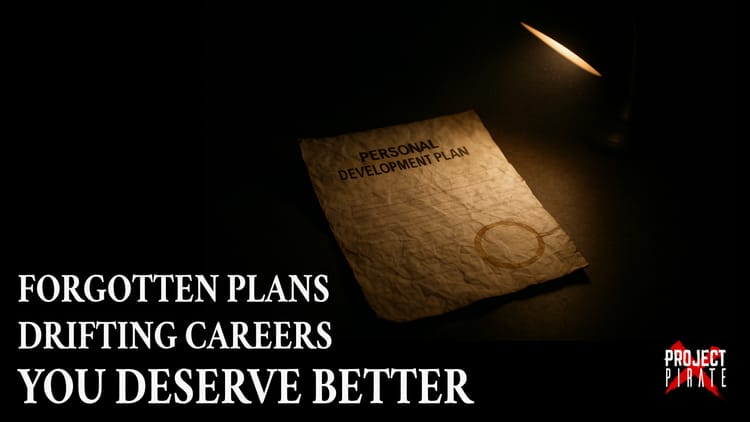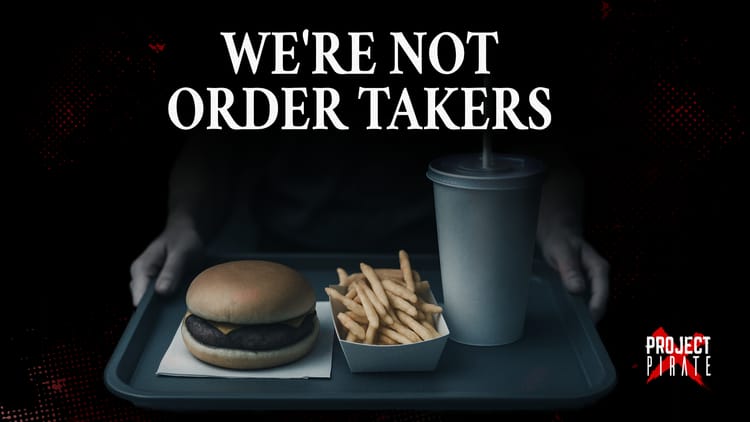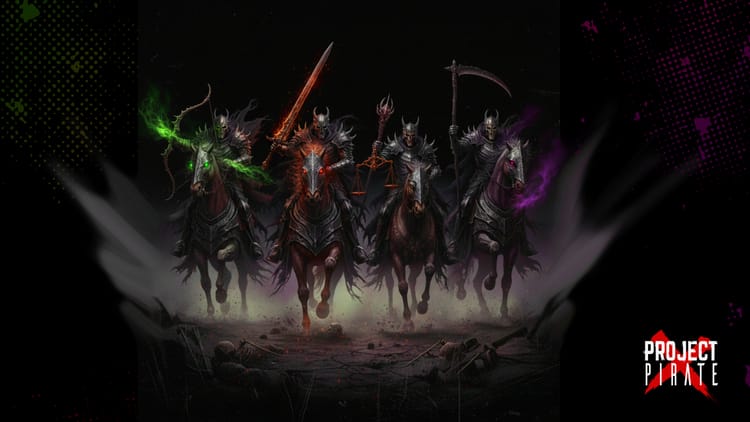"Drink It Up": A Project Manager's Hydration Strategy for High-Seas Delivery

"No sailor sets out on a long voyage without water. And no project manager should sail into delivery without staying 'hydrated' - not just in body, but in focus, purpose and connection."
I watched a £2.3M transformation programme collapse in real-time. Not from technical failure or budget overrun, but from something far more insidious: resource dehydration - the collapse of a team at an exponential rate. 📉
It's late... very late. You're surrounded by empty coffee cups, countless windows full of conflicting stakeholder emails and a Slack channel that's been pinging for the last hour (why is everyone still working at this god forsaken hour). You're drowning in information but dying of thirst for what you actually need.
Sound familiar, Captain? 🏴☠️
Here's the thing every sailor knows but most Project Managers forget: You can die of thirst surrounded by water. You can also fail at Project Management surrounded by data, tools and resources.
The difference between surviving and thriving isn't about having more - it's about having the RIGHT inputs, at the RIGHT time, in the RIGHT amounts. It's about staying hydrated.
As we sail through mid-2025, many of us are looking back at projects that felt like we were constantly bailing water instead of making progress. The statistics tell a brutal story: 50% of project managers report burnout - the highest rate among all professions while 82% of knowledge workers report being at risk.
This isn't just about individual struggle; it's a crisis where teams are being managed with frameworks designed for predictable operational work, not the unique pressures of solving unprecedented problems under uncertainty. The tools multiplied, the meetings increased, but somehow we felt more depleted than ever. It's time to change course.
The Fatal Mistake: Drinking Salt Water
Most Project Managers suffer from what I call "resource dehydration." Not because they lack tools or information, but because they're consuming the wrong kind. They're drinking salt water... meetings without purpose, reports without insight, communication without clarity.
Just like seawater, these false nutrients will kill you faster than having nothing at all. Consider the Project Manager who attends six "alignment meetings" per week but still can't answer basic questions about project priorities. Or the PM who produces detailed status reports that nobody reads because they contain no actionable insights.
The irony is brutal: we've never had more project management tools, yet burnout rates continue to climb. We're drowning in productivity apps while starving for actual productivity.
The solution? Stop adding more inputs and start filtering for the right ones. Build your Project Manager's Hydration Pack.
Why This Framework Changes Everything
Traditional project management focuses on delivery mechanics i.e. schedules, budgets, scope. But the real determinant of success is whether teams can maintain collective resilience while navigating uncertainty together.
There's significant research which supports this insight: teams with strong collective dynamics achieve 72% project success rates compared to 65% without, while project teams are 8 times more likely to fracture under pressure when they lack shared clarity and purpose.
The hydration framework below addresses what operational management approaches completely miss: how to nourish the specific inputs that keep project teams cohesive, confident and capable when facing unprecedented challenges.
This isn't another wellness initiative. It's a leadership approach designed for the unique pressures of project work, where the solution isn't clear and the stakes keep rising. 🔥🥵
🧭 The PM's Nautical Hydration Pack
🧃 Clarity - Your Freshwater Supply
"A parched crew will drink anything - even confusion. Lead with clarity."
The Reality: Vague requirements and shifting goals create toxic confusion that poisons your entire project. In that failed £2.3M transformation programme, I watched the team interpret "launch by Q3" as everything from "soft launch in July" to "full production September 30th." When purpose is unclear, teams create their own interpretations - and those interpretations rarely align.
Your Hydration Strategy:
The One-Page Test: If you can't explain your project's purpose, success criteria, and key constraints on a single page, it's not clear enough. Clarity isn't about having all the answers; it's about being precise with the questions that matter.
Daily Clarity Ritual: Start each day asking "What's the ONE thing that must be crystal clear today?" Write it down. Share it with your team. Return to it when decisions get cloudy.
Decision Frameworks: Create simple rules for common decisions. "When we face competing priorities, we choose based on customer impact first, then technical feasibility." These frameworks prevent your team from constantly escalating decisions that should be straightforward.
Captain's Hydration Test: Can a new Crew member understand your project's purpose in under 2 minutes? If not, you're dehydrated. More importantly - can YOU explain it without jargon or corporate speak? (Now be honest!)
💬 Communication - The Shared Canteen
"Everyone drinks from the same bottle. No one stays hydrated alone."
The Reality: Information hoarding kills projects faster than technical debt. When people don't know what's happening, they make up their own stories - and those stories are usually disasters! Worse, they make decisions based on incomplete information that seemed reasonable at the time.
Your Hydration Strategy:
No Surprises Protocol: Bad news doesn't get better with age; it gets more expensive. Create a culture where problems surface early. "I'd rather hear about a delay when it's 2 days than when it's 2 weeks."
Hydration Circles: Replace status meetings with 15-minute team sync-ups focused on sharing insights, not reading reports. Ask: "What did you learn?" "What surprised you?" "What keeps you up at night?"
Transparent Dashboards: Make progress visible to everyone who needs it, not just leadership. The person testing the API should see the same project health indicators as the Executive Sponsor. (RAG status should resonate with & throughout the Crew)
Communication Equity: Information should flow to those who need it, when they need it. The developer discovering a critical dependency shouldn't have to wait for the next steering committee to raise it.
Captain's Hydration Test: How long would it take someone to find your project's current status? If it's more than 30 seconds, you're dehydrated. If they have to ask three different people for the full picture, you're critically dehydrated.
🌀 Reflection - The Refill Station
"Don't wait till you're dry - pause and refill."
The Reality: Most teams only reflect when things break. By then, patterns have hardened and problems have compounded. Smart Captains refill before they're empty and wise Project Managers reflect before they're in crisis.
Your Hydration Strategy:
Weekly Hydration Breaks: Block 30 minutes every Friday for structured reflection - non-negotiable. Not planning next week's work, but processing this week's learning. What worked? What didn't? What surprised us?
Micro-Retrospectives: After every major milestone or difficult week, ask "What would we do differently?" Don't wait for the formal retrospective when memories have faded and patterns have shifted.
Captain's Log: Keep a weekly journal of key decisions, lessons learned and patterns you're noticing. Not for anyone else; just for you. What looked obvious in hindsight that you missed in the moment? Which stakeholder interactions energized you versus drained you?
Pattern Recognition: Look for recurring themes across different problems. If communication issues keep surfacing, that's not bad luck - that's a system problem requiring a system solution.
Captain's Hydration Test: When was the last time you paused to reflect on what's working well? If it was more than a week ago, you're heading towards dehydration. If you can only remember what's going wrong, you're officially dehydrated!
🔥 Momentum - The Energy Electrolyte
"Morale is the lemon wedge in your hydration mix - tangy and vital." 🍋
The Reality: Water keeps you alive; electrolytes keep you performing. Progress without recognition creates slow-motion team death. People can endure difficult work, but they can't endure feeling like their efforts don't matter.
Your Hydration Strategy:
Micro-Win Celebrations: Acknowledge progress weekly, not just at major milestones. "We closed 12 tickets this week" matters less than "Sarah's debugging approach saved us two days." Celebrate the process, not just the outcome.
Public Recognition: Make achievements visible to the broader organisation. Share success stories in ways that highlight individual contributions while showing project progress. Your team's momentum becomes organisational momentum.
Momentum Mapping: Visualize progress in ways that energize, not just inform. Instead of "78% complete," try "3 major features shipped, 2 in final testing, teams hitting their stride." Show the human story behind the numbers... there's always a 'story'!
Energy Investment: Recognise that momentum requires energy input. Celebrating success isn't "soft" management - it's energy generation that powers future performance... and ask yourself, if you're not going to do it, "who is?"
Captain's Hydration Test: Can your Crew name three specific things they accomplished this week that they're proud of? If not, you're momentum-dehydrated. If they can only list completed tasks without any sense of accomplishment, you're critically dehydrated (outcomes matter!).
🕵️♂️ Insight - The Cold Splash
"A splash of truth wakes you up fast."
The Reality: Comfortable assumptions kill more projects than difficult truths. Sometimes you need shock to wake up to reality. The most dangerous moment in any project is when everything feels like it's going according to plan; because that's often when you're most blind to what's actually happening.
Your Hydration Strategy:
Weekly Temperature Checks: Ask "What aren't we seeing?" with brutal honesty. Not "How are things going?" but "What worries you that we're not talking about?" Create psychological safety for uncomfortable truths.
Outside Perspectives: Bring in external viewpoints monthly - not consultants, but people from other teams, other departments, or other projects who can spot what you've become blind to. Fresh eyes see familiar problems.
Assumption Audits: Regularly challenge what you think you know. Which assumptions are you making about user behavior? Technical constraints? Stakeholder priorities? Timeline estimates? List them explicitly, then test them.
Devil's Advocate Protocols: An interesting concept, but assign someone to actively argue against your approach in planning sessions. Make it a role, not a personality conflict. "Today, Mark's job is to find holes in our launch plan."
Captain's Hydration Test: When did you last receive information that genuinely surprised you about your project? If it's been more than two weeks, you're insight-dehydrated. If your stakeholders never push back on your recommendations, you're dehydrated.
☠️ The Dehydration Death Spiral
Unfortunately, you don't notice dehydration until you're already dying. You don't notice project dehydration until you're already failing.
Here's what PM dehydration looks like... a slow-motion disaster that feels inevitable by the time you recognise it:
Week 1: Small miscommunications that "aren't worth addressing." Someone interprets "soon" as "this week" while you meant "next month." No big deal, right?
Week 3: Team members working on different assumptions. The UX designer thinks you're building for mobile-first, the developer is optimising for desktop. Both think they're right.
Week 6: Stakeholder expectations wildly misaligned. The Sponsor expects launch next month, the Customer thinks it's next quarter, and your team knows it's really six months out.
Week 10: Everyone's working harder but nothing's getting clearer. Overtime (or just extra working time) increases, but progress feels elusive. People are busy but not productive... energy is waning.
Week 14: Project drifts like a ghost ship, nobody sure who's actually steering. Meetings multiply but decisions don't get made. Everyone looks busy, but no one can explain what success looks like anymore.
Week 18: Crisis mode becomes permanent mode. Every problem is urgent. Every deadline is critical. Every conversation is about what's wrong, never about what's working.
Sound familiar? You're not alone. But now you know what to do about it and more importantly, how to recognise the early warning signs before they become terminal symptoms.
🍹 Your Personal Hydration Assessment
Every Captain needs a different mix. Here's how to discover yours:
This Week's Hydration Check:
Clarity (Rate 1-10): How clear are your project goals right now? Can you explain the "why" as easily as the "what"? Do your team members give consistent answers when asked about project priorities?
- Clear documented purpose, easily found, regularly reviewed, team gives consistent answers: 8-10
- Generally documented with minor gaps, mostly consistent team understanding: 6-7
- Some documentation exists but hard to find, team somewhat aligned: 3-5
- Vague goals, poor documentation, team working different interpretations: 1-2
Communication (Rate 1-10): When did you last have a meaningful conversation with each key stakeholder? What channels do you use? How transparent is information flow?
- Multiple channels (Slack/email/calls), regular meaningful conversations, transparent dashboards, no surprises: 8-10
- Good channel mix, bi-weekly substantial conversations, mostly transparent information flow: 6-7
- Limited channels, monthly contact, some information hoarding, occasional surprises: 3-5
- Poor channel management, crisis-only communication, information silos, frequent surprises: 1-2
Reflection (Rate 1-10): What pattern keeps repeating that you haven't addressed? When did you last change your approach based on something you learned?
- Weekly structured reflection, patterns identified and addressed, regular approach improvements: 8-10
- Regular retrospectives with some pattern recognition and occasional improvements: 6-7
- Sporadic reflection, slow to identify patterns, limited adaptation: 3-5
- No structured reflection, repeating same mistakes, resistant to change: 1-2
Momentum (Rate 1-10): How are achievements celebrated? Do sponsors thank the team? Are there awards, recognition in meetings, or small ovations?
- Regular celebration across team/department meetings, sponsor recognition, awards/ovations, team energized: 8-10
- Occasional recognition in meetings, some sponsor visibility, generally positive energy: 6-7
- Limited celebration, minimal sponsor engagement, mixed team energy: 3-5
- No structured recognition, absent sponsors, team grinding without acknowledgment: 1-2
Insight (Rate 1-10): What assumption are you most afraid to question? When did someone last tell you something about your project that surprised you? Do you actively seek external perspectives?
- Regular external perspectives, frequent surprising insights, active assumption challenging: 8-10
- Occasional outside input, some surprises, periodic assumption review: 6-7
- Limited external perspectives, rare surprises, infrequent assumption testing: 3-5
- Echo chamber, no challenging viewpoints, assumptions never questioned: 1-2
Your Personal Hydration Score: Add up your ratings.
- No area below 7 AND total 40-50: Well-hydrated and thriving.
- One area 5-6 OR total 30-39: Functioning but vulnerable.
- Any area below 5 OR total 20-29: Dehydrated and at risk.
- Multiple areas below 5: Emergency rehydration needed.
Your Hydration Action Plan
Pick your LOWEST scoring area and focus there this week. Set a daily reminder. Track it like you track your tasks. Remember: you can't fix everything at once, but you can fix one thing completely.
Because here's the truth: The best Captains don't just survive the voyage - they arrive with a Crew that's stronger than when they started.
The Navigator's Challenge
For the next week, track your hydration using these five sources. Notice which ones you naturally neglect. Notice when you feel most "dehydrated" during the day - is it after certain types of meetings? When dealing with specific stakeholders? During particular phases of work?
Pay attention to the relationships between different hydration sources. When communication drops, does clarity suffer? When reflection disappears, does insight dry up? When momentum flatlines, does everything else feel harder?
Then ask yourself the Captain's question: What would change if you treated your project inputs like survival supplies?
Building Team Hydration Rituals
The most successful implementation happens when hydration becomes a shared team practice, not just something the PM monitors. Here are proven approaches:
Weekly Crew Hydration Checks: Transform your retrospectives into hydration assessments. Have each team member rate the five sources and discuss where collective attention is needed.
Hydration Buddies: Pair team members to check each other's hydration levels. Sometimes we're blind to our own dehydration but can spot it easily in others.
The Crew's Weather Report: Start each sprint with a simple question: "What's the weather forecast for our five hydration sources this sprint?" This creates shared awareness of potential storms.
Alternative approach: For teams less comfortable with nautical language, frame it as "Team Health Check": "How are we doing on clarity, communication, reflection, momentum and insight this sprint? Where do we need to focus our energy?"
Dehydration Early Warning System: Teach your team the warning signs so they can raise flags before crisis hits. When someone says "I think we're drinking salt water on this," the team knows to pause and assess.
When Leadership Support is Missing
Not every Captain has the luxury of supportive leadership. If you're implementing this framework without top-level buy-in:
Start Small and Prove Value: Focus on your immediate team first. Document the improvements in team performance, morale, and delivery quality.
Speak Their Language: Translate hydration improvements into business metrics leadership cares about: reduced rework, faster delivery, fewer escalations, improved stakeholder satisfaction.
Create Your Own Oasis: Even in dysfunctional organisations, you can create a pocket of proper hydration for your team. This often becomes the model others want to replicate.
The Compound Effect of Staying Hydrated
Teams that master this framework don't just deliver better projects - they transform how they work together:
- Faster Problem-Solving: Well-hydrated teams spot issues earlier and resolve them with less drama
- Reduced Burnout: When teams feel nourished rather than depleted, sustainability increases
- Better Stakeholder Relationships: Clear communication and momentum create trust
- Knowledge Retention: Teams that reflect together retain lessons that benefit future projects
- Magnetic Team Culture: High-performing, well-hydrated teams attract the best people
The Choice That Defines Your Voyage
Every project team will face their collective dehydration moment. You'll recognise it instantly: the realisation that despite everyone working harder than ever, nothing feels coordinated. People are busy but pulling in different directions, consuming information but starving for purpose.
In that moment, you have two choices:
Keep the whole Crew consuming salt water - endless meetings without decisions, reports that create confusion rather than clarity, tools that fragment communication rather than unite it. Watch as individual team members start to wither, lose momentum and drift toward their own interpretations of success.
Or build a collective hydration system. Start with your team's lowest scoring area. Make it everyone's responsibility, not just the Project Manager's. Create rituals where the entire Crew checks their hydration levels together.
Because here's the truth about project teams: when clarity dries up, everyone starts guessing. When communication dries up, trust evaporates. When reflection disappears, the team repeats the same mistakes. When momentum dies, even the most talented individuals can't row the ship forward alone.
Remember: The best Captains don't just survive the voyage - they arrive with a Crew that's stronger than when they started. Teams that stay hydrated don't just deliver projects; they transform together. They develop skills they didn't know they needed, forge bonds that outlast the deadline and discover capabilities that surprise even themselves. They dock at the destination not exhausted and depleted, but energised and cohesive - ready for whatever waters come next.
That's the true test of success: not just surviving the storms, but thriving through them.
What kind of voyage will your team choose when the next storm hits?
Ready to build your Hydration Pack? Join the many Project Managers & Transformation Leads who've transformed their delivery approach by focusing on nourishment over noise. Because great projects aren't just managed... they're nourished. 🧃
Remember: the strongest ships aren't built with the most advanced tools, but with crews who understand the difference between consuming information and being truly nourished. When teams master the art of strategic hydration - choosing clarity over complexity, insight over assumptions, momentum over motion - they don't just survive the voyage, they transform together.
"Drink It Up" explores how project teams can die of thirst while surrounded by resources, and why the solution isn't more tools or frameworks, but better filters for what actually sustains high-performing delivery. The question isn't whether your team is busy... but whether they're properly hydrated for the challenges ahead.
Join The Crew! 🏴☠️
